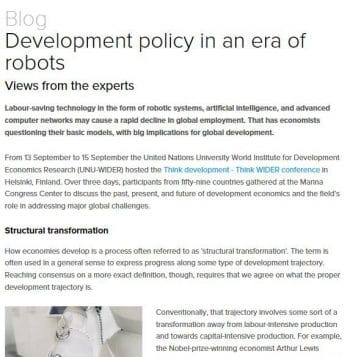
Policy highlights:
- This blog on the UN-WIDER website discusses the outcomes of the Think Development-Think WIDER conference. Based on the discussions at the conference, economic development models are questioned, specifically, those that assume that greater supply in the market will automatically create sufficient demand for products. It is assumed that moving from agriculture to industry (which creates a decline in the labour share) will still generate sufficient employment to support economies and societies.
- Economists now argue that demand is generated in part by global income, which is determined by workers’ wages. When labour shares decline, a smaller share of the value produced is in the consumer’s hands. Technological advances, therefore, threaten market demand.
- It is argued that policy should focus on generating higher demand by increasing consumer income, to support the global market supply. This implies that it is good practice to universalize access to basic rights and services like food, housing, and health, and consider policies like a universal basic income to reduce both poverty and inequality.
- Finally, it is important to recognize that redistributive policies do not come at the cost of less efficiency, while inequality has been shown to hamper (sustained) growth, promote the rise of nativist parties and fuel anti-growth policies.










